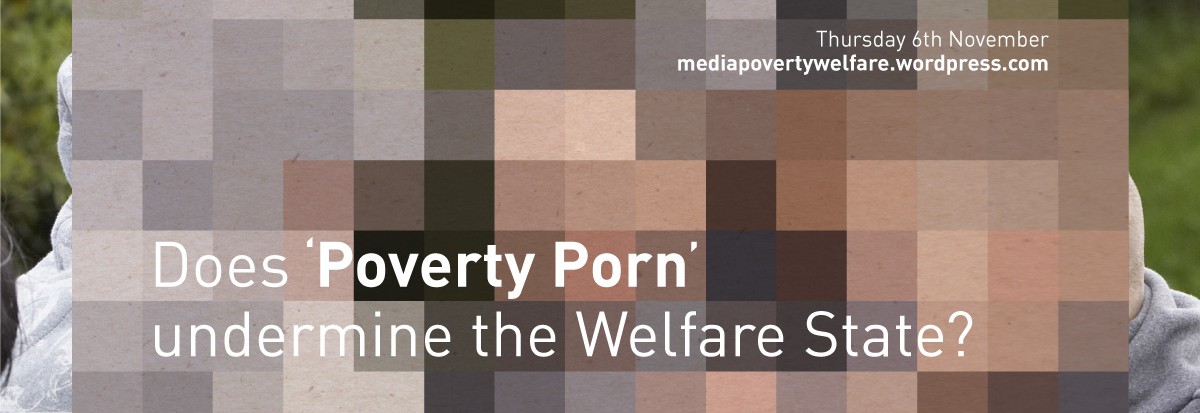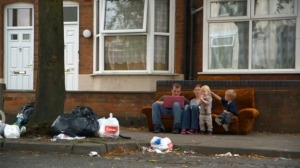The fate of groups is bound up with the words that designate them (Bourdieu, 1984)
Aust[ralian] election public sick of public sector workers and phony welfare scroungers sucking life out of economy. Others nations to follow in time. (Rupert Murdoch tweet 2013)
Benefits Street, made by Love productions, is a six-episode reality television programme first screened on the 6th of January 2014 on Channel Four. The ten-second opening sequence begins with a camera panning over the rooftops of a row of terraced houses, a generic ‘view from above’ which establishes from the outset ‘the voyeurism of one class looking at another’ (Higson 1996:152, see also Lovell 1996 and Tyler 2011). As the shot pans across the roofs, a woman’s voice calls out the word ‘unemployed’ in a soft Birmingham (Brummy) accent. The shot then cuts to street-level, a young woman, dressed in a hooded top, jeans and a baseball cap appears, filmed from behind she is walking down a street, pointing to individual houses, while she chants in unison with a man (who is off camera), ‘unemployed, unemployed, unemployed’. Then an elderly male voice with a Caribbean lilt begins speaking off camera, ‘You see this street here, James Turner Street’. The film cuts again, and the camera pans across the street revealing three men, two of them are smoking in the doorway of a house, a third, his face pixelated, approaches them in a hooded sports top. This is followed by a rapid cut to a shot of a large pile of domestic waste in the street, split black plastic rubbish sacks lie under a tree spilling their contents across road and pavement as children play nearby. Chants of ‘unemployed, unemployed’ punctuate this sequence of visual shots. The elderly male narrator then appears in the frame, speaking directly to camera in extreme close up, he finishes his sentence ‘this…used to be one of the best streets …. now…one of the worst’.
Henry Giroux argues that the contemporary life is characterised by a `biopolitics of disposability` in which `poor minorities of color and class, unable to contribute to the prevailing consumerist ethic, are vanishing into the sinkhole of poverty in desolate and abandoned enclaves of decaying cities [and] neighborhoods’ (Giroux, 2007, p. 309). In the UK, politicians have diagnosed this condition as ‘Broken Britain’: an ‘ideological displacement’ which as Emma Dowling and Davie Harvie argue, enables ‘structural conditions of a deep social, political and economic crises’ to be imagined as problems of ‘individual behaviours’ (Dowling, et al., 2014 p. 872) . Through this ‘rhetorical device’ the actual deepening precarity of the working classes is narrativised as a ‘moral crises’ (Dowling, et al., 2014 p. 872).
The opening sequence of Benefits Street transports its audience into this powerful political imaginary. From the programmes title, Benefits Street, through to the splicing of images of rubbish strewn streets, unattended children, loitering youths, cigarettes and alcohol, hooded tops and baseball caps, punctuated by a soundtrack of ‘unemployed, unemployed, unemployed’, the audience is instructed to reimagine the welfare state as a ‘benefits culture’, which impoverishes citizens, feeds addictions and creates what government ministers such as Iain Duncan Smith have described as fatal dependencies amongst ‘those trapped in its clutches’ . As a headline in The Spectator summarises, ‘Benefits Street exposes Britain’s dirty secret – how welfare imprisons the poor’.
Benefits Street powerfully demonstrates the pivotal role of media culture in naturalizing the ideology of Broken Britain. Love Productions, 70% owned by Rupert Murdoch’s global media conglomerate Sky, describes Benefits Street, as a ‘documentary series’, ‘an honest depiction’ which ‘reveals the reality of life on benefits’ and ‘give[s] voice to a community that don’t really have a voice’ ). However, television, as Pierre Bourdieu reminds us, is ‘an industry which edits and organizes perception, offering visions of the world, classified, portioned and divided in specific ways’ (Bourdieu in Crossley and Slater 2014). The accumulation and repetition of televisual figures of ‘the undeserving poor’ exerts powerful limits on the political imagination by establishing a consensus that Britain, in the words of one viewer, is ‘crawling with workshy, malingerers’ (ref northern echo). In this way, programmes like Benefits Street establish new rules for the ‘audio-visual policing’ of precariat populations: the marginal, disenfranchised, the underemployed and the unemployed (Rancière 1999, p. 29). As Stephen Crossley and Tom Slater (2014) put it, this is ‘the (tele)vision of divisions’ . The dystopian visions of ‘Broken Britain’, televised by programmes like Benefits Street, are used to ‘politically justify austerity policies’ (Dowling, et al., 2014 p. 875), producing scapegoats for the inequalities which unfold from the crisis of financial capitalism. A reminder that the post-industrial working class not only face precarious employment, downward social mobility, and extreme social insecurity, but endure conditions of ‘heighted stigmatisation […] in daily life as well as in public discourse’ (Wacquant, 2008, pp. 24-25).
More than this though, as I argue in my book Revolting Subjects (2013), the formation of ‘national abjects’ in the public sphere, are technologies of social control through which the transition from welfare to postwelfare states is effected. And there is not only ‘political capital’ to be made here. Reality television production companies like Love specialise in exploitative production processes, harnessing the labours of unwaged participants as ‘human capital’ to produce immense wealth for global media tycoons like Rupert Murdoch. Indeed Benefits Street, achieved peak viewing figures of 6.5 million, making this one of Channel 4’s most popular, and most profitable, television programmes of the year: Yet more ‘accumulation through dispossession’ (Harvey, 2004).
The political aesthetics of ‘Broken Britain’ was not, however, passively accepted by the audience of Benefits Street. Indeed, over the course of 2014, Benefits Street emerged as the site of dense and fractious struggle, amongst the residents of James Tuner Street, television producers, television viewers, politicians, newspaper journalists, television pundits, anti-poverty groups, policy-makers and sociologists (see for example important work of Jensen 2013, 2014 and Allen et al. 2014) —exemplified by the ‘Does ‘Poverty Porn’ undermine the Welfare State?’ public event taking place next week.
On August 30th 2014, a group of Middlesbrough[i] football club supporters called ‘Red Faction’, unfurled a banner at the clubs Riverside Stadium which read ‘Being Poor is not Entertainment … F**k Benefits Street’ (image below).
This protest against stigmatising television depictions of people living with poverty was stirred by the arrival of a Love Productions television crew in the neighbouring town of Stockton, which had been chosen by the production company as the location for a second series of the Benefits Street. Red Faction had identified that it is ‘no longer possible […] to conduct social struggles without having a specific programme for fighting with and against television’ (Bourdieu, 1998 p.57). The chants of Red Faction on the football terraces that day were a retort to the chant of ‘unemployed, unemployed, unemployed’, with which Benefits Street opens. Under the glare of television cameras, their protest was an imaginative dissent against `the politics of disposability’ (Giroux, 2007). Indeed, the ‘F**k Benefits Street Protest’ is indicative of ongoing class struggles against the symbolic violence and material dispossession of ‘neoliberal capitalist domination’ (Bourdieu, 1998 p. 10).
*This blog was written by Imogen Tyler ( Lancaster University) who will be speaking at the event on the 6th November
Work Cited:
Allen, K, Tyler, I. and S. Benedictis (2014) ‘Thinking with “White Dee”: The Gender Politics of “Austerity Porn”’ Sociological Research Online 19 (3): http://www.socresonline.org.uk/19/3/2.html
Bourdieu, P. (1998) Acts of Resistance: Against the Tyranny of the Market, New York: The New Press and Polity Press
Crossley, S. and T. Slater (2014) ‘Benefits Street: territorial stigmatisation and the realization of a ‘(tele)vision of divisions’”’ https://values.doc.gold.ac.uk/blog/18/
Dowling, E. & D. Harvie (2014) ‘Harnessing the Social: State Crises and (Big) Society’ Sociology 48 (5) pp. 869-886.
Giroux, H. (2007) ‘Violence, Katrina, and the Biopolitics of Disposability’. Theory Culture Society, 24(7-8), pp. 305-309.
Higson, A. (1996) ‘Space, Place, Spectacle: Landscape and Townscape in the “Kitchen Sink” Film’, in A. Higson (ed.), Dissolving Views: Key Writings on British Cinema (London/New York: Cassell), pp. 133–56.
Jensen, T. (2013), ‘A Summer of Television Poverty Porn’ http://sociologicalimagination.org/archives/14013
Jensen, T. (2014) ‘Welfare Commonsense, Poverty Porn and Doxosophy’, Sociological Research Online 19 (3) http://www.socresonline.org.uk/19/3/3.html
Lovell, T. (1996) ‘Landscapes and Stories in 1960s British Realism’, in A. Higson (ed.), Dissolving Views: Key Writings on British Cinema (London/New York: Cassell), pp. 157–77.
Tyler, I. (2011) ‘Pramface girls: the class politics of ‘maternal TV’, in Helen Wood and Beverley Skeggs (eds.), Reality Television and Class (Basingstoke: Palgrave Macmillan), p.210-24.
Tyler, I. (2013) Revolting Subjects: Social Abjection & Resistance in Neoliberal Britain. (London: Zed)
Wacquant, L (2008) Urban Outcasts: A Comparative Sociology of Advanced Marginality.( Cambridge; Malden: Polity Press).



Reblogged this on Social Abjection .
LikeLike